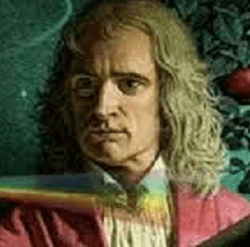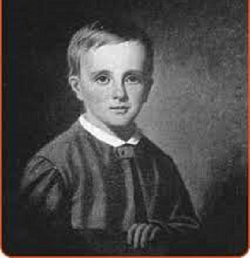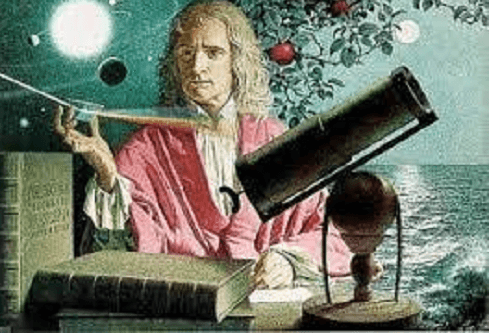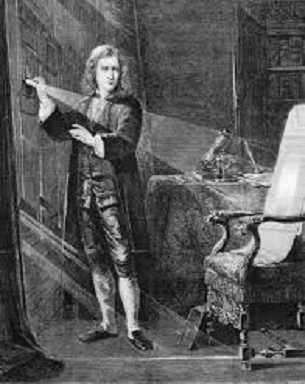Isaac Newton
We all remember Sir Isaac Newton for his discovery of Gravitational force. His discoveries and inventions were that's not it. Till today, he is worshipped as the father of physics. One of the greatest scientists, Albert Einstein, said that Newton was the most influential scientist in the history of science. Not just his discovery of gravity, he is famous for 'Principia Mathematica' and the discovery of calculus. Sir Issac Newton is a renowned mathematician and physicist, and there is a long list of his discoveries and inventions. Newton's laws, inventions and philosophies made a scientific revolution in the seventeenth century. Calculus, the biggest part of mathematics, was discovered by Sir Isaac Newton. Even though many scientists from previous centuries were already discovering it, Newton was the seventeenth-century calculus hero. Newton's laws have been taught in school since the sixth grade. Newton left the present generation with a piece of much information on philosophy, science, maths and nature. He did contribute his scientific knowledge to the theory of colour, which we call optics. Sir Newton was a partial astronomer too. Though he has done significant work on chemistry and history, only his work on physics was recognized. After Newton discovered gravity, he faced a lot of negativity and opposition from other scientists all over the world. Later universally, the theory was accepted by the scientists. Newton left answers to unsolvable questions and dedicated his whole life to scientific contributions. His apple incident is still remembered in people's minds. Newton as a Kid:Sir Isaac Newton is a sixteenth-century kid born on Christmas. Newton was born on 25 December 1642 and had a bad childhood. He lost his father before his birth. According to some internet sources, Isaac Newton was a premature baby. His childhood did not go well because his mother married another man, which he did not like. 
At age twelve, Newton left his home and started living with William Clarke's family, who was an apothecary. Clarke provided residence for Newton for three years. Since Clarke's work is towards medicines, Newton became fascinated with that and developed an interest in Chemistry. William observed his interest and encouraged him to attend school. Newton attended The King's School in Grantham, England. He discontinued school and was forced to do farming by his mother. As a kid, newton was enthusiastic about things around him. Imagine a kid constructing windmills and mechanical devices. It says how smart newton is at that young age. There was a civil war going on in England from the year newton was born, and while he was in school, it affected his studies. He was influenced by philosophy at the age of fifteen. Newton wrote a phrasebook that said 'Loving friend' while he was schooling. Newton's life as a college student:Newton started attending Trinity College Cambridge in England at nineteen years of age. We now teach students in school about newton and his theories. Ever wonder what was taught to newton. They used to teach about Aristotle and his theories, philosophies etc. He improvised some of the scientists already found theories in college. He completed his graduation in 1665. But he has not been distinguished as a student from Cambridge since the plague attacked the same year and the university was shut down. Later in 1667, he came back to university as a fellow of university. 
Meanwhile, he did his private studies and brushed on his theories. He discovered and prepared new theories, philosophies and maths on his own. Reportedly, he started the foundation for calculus during this period. After his bachelor's, newton decided to pursue a master's, receiving his master's degree in 1669. One of the professors, Lucasian Isaac Barrow, was impressed by newton's theories and was elected a Fellow of the Royal Society. Inventions:When he was in college in 1665, he discovered the binomial theorem. He improvised it and named it infinitesimal calculus. In 1666, he started working on calculus, an advanced part of mathematics. After Newton's development in calculus, there were huge disputes between newton and other fellow scientists. Many scientists older than newton claimed that it was their work on calculus, and at last, newton got the credit for his set of works. The mathematics foundation association, namely 'Principia', approved newton's work and named his book ' a book dense with the theory and application of the infinitesimal calculus.' There are many theories and derivations that newton has done over the years. Here is the list of his theories and derivations:
In 1667, Issac Newton got his master's and was considered a 'Fellow of the college of the Holy and Undivided Trinity.' Later in 1669, Newton was joined as 'Lucasian chair of Mathematics' by Isaac Barrow, the then Lucasian professor. Optics:Newton partially discovered optics in 1666. He started lecturing on colours, refraction and lights from 1670 to 1672 and discovered the spectrum in this period. After his clear study of colours and light, Newton named that theory 'Newton's theory of colour'. Telescope:Newton's idea behind the discovery started when he understood about the rainbow and how it is caused. He then experimented with all kinds of metals and chemicals. He concluded to choose tin and copper as an alloy. He designed a telescope, and it is called 'The Newtonian telescope.' If you wonder how it is different from other telescopes, Newton made this Telescope with a reflective lens instead of the standard one. In 1671, he worked on a book called 'Opticks'. The royal society also encouraged him in his work on the Telescope. Newton and another scientist Robert Hooke worked together on a few theories. However, they had clashes between them. He then finally published 'Opticks' in 1704. Newton designed an electrostatic generator in a basic form and later developed an advanced mode. Newton's Telescope will prevent the colour distortion caused by other colours and rainbow effects. It can bend light and magnify the images to view them more clearly. In the present day, Newton's Telescope is taken care of by Newton's group of telescopes. It is presently in the Royal Society of London. It is put in for the exhibit, and it travels the world for the exhibition from time to time. Gravity:The discovery of gravity happened when he watched an apple fall from a tree. Although there were speculations regarding this incident that it was a myth. Some autobiographies say that the discovery of gravity happened when an apple hit newton's head, and some say he was watching when an apple fell. Whichever the story it is, his intellectual brain has introduced the concept of gravity to the world. Newton wanted to explain his theory with simple mathematical equations. He then prepared three laws for the gravitational theory he discovered. Principia approved them. Those three laws were published after twenty years. These laws were a bit improvised by Albert Einstein later. But the foundation for these laws was done by Sir Isaac Newton. This discovery made it easy to understand nature's reality and the physics of the earth for further scientists. He came up with the complete concluded theory after almost twenty years. He then worked on orbital motions called 'universal gravitation.' Later Life:Newton was a member of the parliament of England. Newton was appointed as warden in 1696 to Royal Mint. After a while, he became a deputy in charge of an English royal astronomer Edmond Halley. Newton, in his thirties, became a warden in the Royal Mint. In 1688, there was a green revolution happening between Ireland and Scotland. Newton supported the winning side and was given the position in the Royal mint. Newton was given the position of the civic head in King's College, Cambridge, by John Locke. But due to other religious politics, Newton could not secure the designation as the appointment kept delayed yearly. 
He was promoted to the higher hierarchy as master of the mint. He worked in that designation for thirty years. He fulfilled his duties sincerely working in the Royal mint. He performed duties to fish out coiners and successfully prosecuted around 30 coiners while in charge. During the time of 'The Grand Alliance war', a huge amount of crime happened on coinage. Newton took his charges sincerely and tried to eradicate the coinage fraud as much as possible. He was always awarded the title of 'Master of the Mint.' It rewards almost twelve hundred euros to fifteen hundred euros per year. In 1703, he became president of The Royal Society. He's also an associate of the French Academie des Sciences. Queen Anne best ranked Newton in 1705. Newton is the second person to get this honour after Francis Bacon. There were better experiences too for newton. In 1720, he invested twenty thousand dollars in the South sea company, losing the total money. Many controversies went on Newton's inventions and discoveries. Robert Hooke, a British scientist, commented critically on his optics theory. Hooke had a different perspective on optics theory. Therefore he expressed negativity towards Newton's theory. Another controversy happened with the paper called 'Properties of Light.' They both then settled on a polite conversation between them. Honours:A signature of newton is still preserved on the library window of newton's school, The King's. There is a statue of Newton we can see in Westminster, London. A currency with newton's image is issued in England for ten years. There is a newton monument at the oxford university museum in England. Also, a bronze statue at the British Library can be seen in London. Another bronze statue is present at Grantham, London. The familiar system of the unit of force is kept as newton. Newton's work on the gravitational force was recognized by international prominence. The scientists in the United Kingdom worship him as their guru. Artistic Honours:
In his last days:Newton lived in Winchester with his niece during his last days. His niece worked as a hostess in London. In his ending days, he expanded the editions of the books that he published. Some websites reported that Newton suffered from health issues from 1692 to 1693. He had nervous breakdown issues and depression for a longer period. He also suffered from insomnia and digestion issues. Over eighteen months, Newton dealt with these issues. In 1727, the best genius mind lost his life in sleep. His funeral was conducted grandly by scientists and philosophers. His funeral happened in Westminster Abbey, London. Some of the sources say that newton died because of mercury poisoning. He died at the age of eighty-four. Interests and Beliefs:Newton was never married. His friend circle is also too small. While residing in London, he was friends with John Locke, an English philosopher. Locke was an admirer of Newton and his theories. He was one of his few well-wishers who used to feel disappointed in his earnings on his pay for his theories. His favourite colour was described as a reddish tinge, also called violet. Reportedly, it is said by the sources that newton is a generous and sincere person. A few of newton's friends say that newton suffered from autism and nervous breakdown. Newton was born in an Anglican family. He believes in Christianity. Every person appointed as Lucasian Professor is supposed to take holy orders, and newton refused to take them. Newton had also taken permission from Charles two, the then King of Scotland. There has been a big controversy between his Christianity and Anglican orthodox partial religious beliefs, which confused some scholars and made them recheck Newton's theological papers. Newton's mother's death made him very depressed. He isolated himself from his work for a while. When he was in isolation, he started gaining interest in Italian literature. He has been a mechanical philosopher also for a while. He lectured about natural phenomena to the students of Cambridge University.
Next TopicDraupadi Murmu
|
 For Videos Join Our Youtube Channel: Join Now
For Videos Join Our Youtube Channel: Join Now
Feedback
- Send your Feedback to [email protected]
Help Others, Please Share









